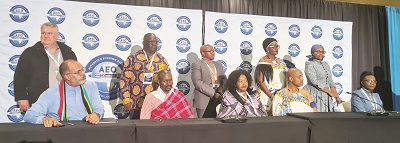(Emperors Palace Convention Centre, Johannesburg, South Africa – 31st May 2023)
South Africa, Botswana, Lesotho, Namibia and Eswatini came together for Southern African Customs Union (SACU) Regional Authorised Economic Operator (AEO) Programme Awareness Session where the highlight was signing of SACU Regional Mutual Recognition Arrangement. Being an AEO gives a business a ‘VIP’ status where there is timed cross border clearance making the process smoother and efficient for businesses.
Mr Thabo David Khasipe the Executive Secretary of Southern African Customs Union when explaining the AEO Programme and its benefit for SACU Member States, said the meeting in South Africa was a culmination of sessions that were held in Botswana, Eswatini, Lesotho, and Namibia respectively in March, April and May 2023, to build a programme that is intended to bring benefits to business in the region. He said the session was therefore to strengthen dialogue amongst the stakeholders.
The Executive Secretary mentioned the session about AEOs was not about how customs wants business to be done, but was about equal partnership to discuss how customs and business work together in partnership. Only through mutual partnerships shall goals be achieved. The dialogue was highlighted as important to eliminate the working in silos of the stakeholders and partner countries which is not beneficial to all partners. There is customs at the border posts, then government agencies. Mr Khasipe said ‘A chain is only as strong as its weakest link’, therefore it is important to strengthen not only the strong link but also at the weak link. ‘You can’t get to a border post and enjoy AEO and customs clears you in record time, but immediately after clearing, immigration stops you or police man stops to check consignment, or health or agriculture stop you to do their job’. There is therefore a need to integrate all the players such that AEO derives ALL benefit from the whole programme.
Mr Khasipe indicated it is trivial to consider the network effects (connecting individual players) such that all players benefit. The more the players there are be it AEOs and other key stakeholders, then the more the benefit one gets from the relationship. Value is added by increasing the users and having more people join the network. That is why all the member states programmes are valuable, but become more valuable when they are connected within each other to take advantage of network effects. He further said this should not end in SACU but also other countries (mutual benefit agreement between member states, where AEO becomes a VIP in all other countries). AFCFTA can be leveraged where SACU will have fully positioned itself and be in position to work with other states.
Targets need to be set on numbers. But the programme should also be beneficial and be happening on the ground. It would be very disappointing if the accreditation in one country is not recognised in another country. This AEO programme is not being done as an end in itself. It actually geared towards developing the SACU region for the benefit of its members. BUSINESS IN SACU IS BEING GIVEN A LEG UP by being assisted with speedy clearing assistance as time is money. Predictability should be used to manage time clearing at the borders.
The Commissioners General from the five countries signed the Arrangement after a series of discussions on what the AEO programme is intended to achieve. There was emphasis on the need to provide capacity building for SMEs, Women and the Disabled to ensure they also graduate to enjoy the status hence benefits of AEO status. The signing of the arrangement was declared as the highlight of SACU to develop, to industrialize, and to ensure that businesses are ready to conquer and penetrate the rest of Africa, and the rest of the world!
After this SACU engagement, there shall be engagements with East, West, Northern and Central Africa to build regional, global and continental value chains at low costs by customs administrations. Currently there are over 160 SACU Accredited Economic Operators (3 Botswana, 2 Eswatini, 10 Lesotho, 1 Namibia, 160 South Africa).


